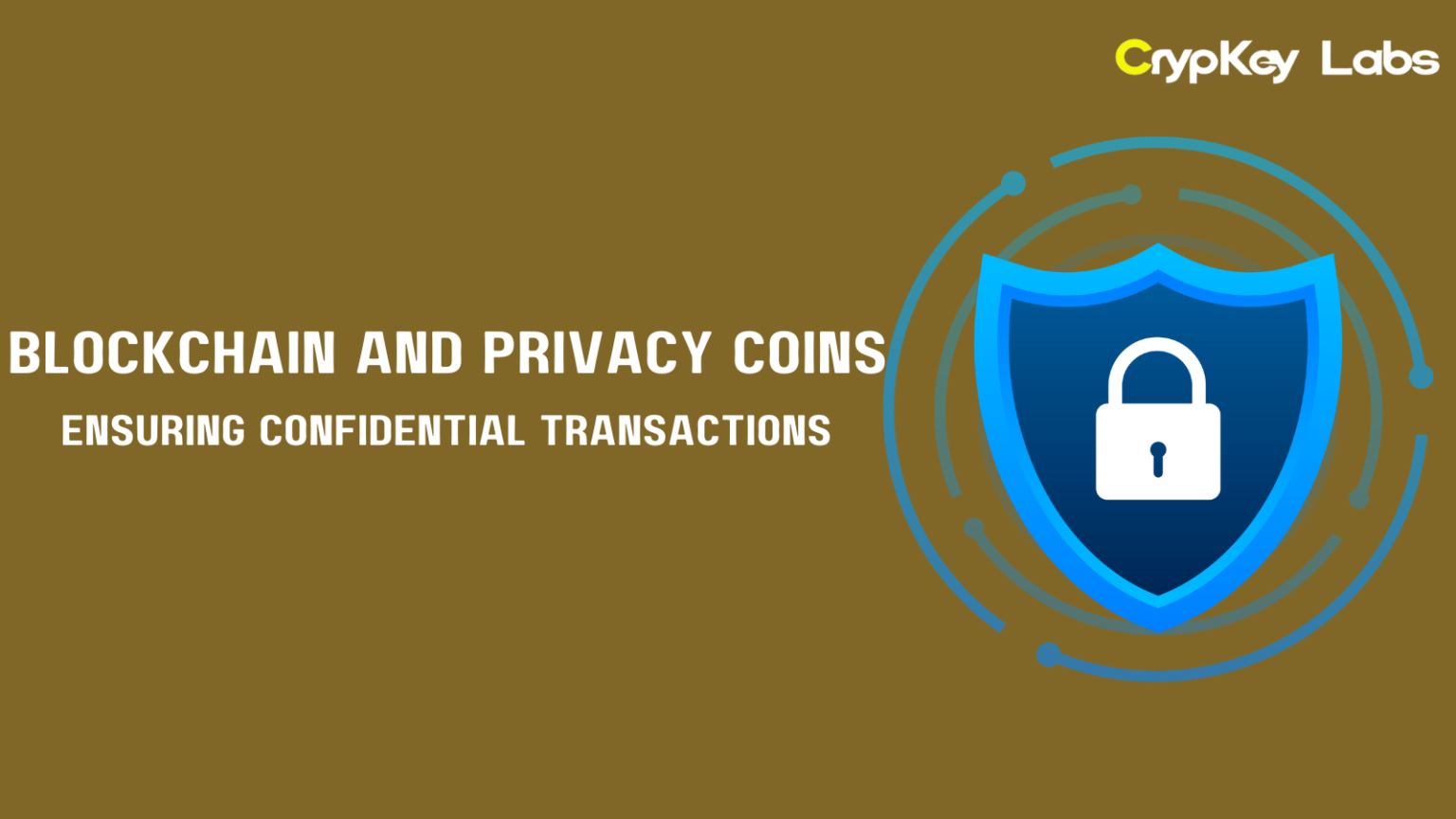Privacy in today’s digital age is becoming a major concern, especially when it comes to financial transactions. With blockchain technology gaining popularity for its decentralized and transparent nature, a significant question arises: how do you protect privacy while still maintaining the benefits of blockchain? The answer lies in privacy coins. In this blog, we’ll dive into what privacy coins are, how they ensure confidential transactions, the technology behind them, and the challenges they face in today’s regulatory environment.
Introduction to Privacy in Blockchain
Blockchain’s Transparent Nature
Blockchain is often praised for its transparency, where every transaction is recorded on a public ledger and can be viewed by anyone. While this openness is a great feature for auditing and trust, it has a downside: it compromises user privacy. When all transactions are available for anyone to see, personal details like transaction amounts, sender and receiver addresses, and patterns of behavior can easily be tracked. This transparency may not work for everyone, especially those concerned about financial privacy.
Importance of Confidential Transactions
The rise of privacy concerns in the digital world has increased the demand for confidential transactions. Whether it’s individuals who don’t want their financial dealings made public or businesses that require discretion in their dealings. Privacy in transactions is becoming more important than ever. This is where privacy coins step in, offering users the ability to keep their financial activities confidential while still leveraging blockchain technology.
What are Privacy Coins?
Definition of Privacy Coins
Privacy coins are a type of cryptocurrency designed to offer anonymity and confidentiality in transactions. Unlike standard cryptocurrencies like Bitcoin or Ethereum, where transactions can be traced. Privacy coins make it impossible (or extremely difficult) to link transactions to specific individuals or entities. Privacy coins use various cryptographic techniques to ensure that transaction details remain hidden, keeping user data and transaction history private.
Differences Between Privacy Coins and Regular Cryptocurrencies
The key difference between privacy coins and regular cryptocurrencies lies in how transactions are handled. Regular cryptocurrencies like Bitcoin allow anyone to view transaction data on the blockchain. Including the sender’s address, receiver’s address, and the transaction amount. Privacy coins, on the other hand, obscure this information, ensuring that only the participants involved in the transaction can view its details. This makes privacy coins especially useful for users who value discretion and security.
Leading Privacy Coins in the Market
Monero (XMR)
Monero is perhaps the most well-known privacy coin, and for good reason. It uses a combination of cryptographic techniques like ring signatures and stealth addresses to obscure transaction details. Ring signatures mix a user’s transaction with others, making it difficult to determine the actual sender. Stealth addresses create one-time addresses for each transaction, ensuring that only the sender and receiver know the transaction’s true destination. Monero is widely regarded as the gold standard in privacy coins due to its focus on complete anonymity.
Zcash (ZEC)
Zcash offers a different approach to privacy by using zero-knowledge proofs, known as zk-SNARKs. This technology allows transactions to be verified without revealing any information about them. Zcash also gives users the option to either make their transactions public or shield them for complete privacy. This flexibility allows users to choose when they want privacy and when they want transparency, which makes it unique among privacy coins.
Dash (DASH)
Dash isn’t exclusively a privacy coin, but it offers a feature called Private Send. Which allows users to send private transactions if they choose. PrivateSend works by mixing a user’s coins with other users’ coins, making it difficult to trace the origin of the transaction. While Dash doesn’t offer the same level of privacy as Monero or Zcash. It provides users with the option to transact privately when necessary.
Other Noteworthy Privacy Coins
In addition to Monero, Zcash, and Dash, other privacy coins like Verge (XVG) and Beam (BEAM) are making waves in the space. Verge uses multiple anonymity networks to mask IP addresses and transaction details, while Beam employs the Mimblewimble protocol, a lightweight privacy framework that enhances transaction confidentiality without bloating the blockchain.
The Role of Privacy Coins in Ensuring Confidential Transactions
Advanced Cryptographic Techniques
At the core of privacy coins are advanced cryptographic techniques designed to ensure that transaction details remain confidential. These techniques, such as zk-SNARKs, ring signatures, and stealth addresses, go beyond simple encryption. They create complex, untraceable pathways for transactions, ensuring that no one except the intended parties can see the transaction details.
Untraceable and Unlinkable Transactions
The key to privacy coins’ success lies in their ability to make transactions untraceable and unlinkable. In traditional cryptocurrencies, once someone knows your wallet address, they can track your entire transaction history. Privacy coins prevent this by creating temporary or one-time addresses for each transaction, ensuring that no one can link your past or future transactions to a single wallet.
Transaction Confidentiality Features
Stealth addresses, ring signatures, and zk-SNARKs are just a few of the many transaction confidentiality features that privacy coins offer. These features make it nearly impossible for third parties to observe, track, or analyze your transaction history. This confidentiality is particularly beneficial for users who need to keep their financial activities private, whether for personal or business reasons.
Legal and Regulatory Challenges of Privacy Coins
Government Scrutiny and Regulations
As privacy coins grow in popularity, they are also coming under increased government scrutiny. Regulators are concerned about the potential misuse of privacy coins for illicit activities like money laundering, tax evasion, or financing illegal operations. Many countries are working on policies to regulate or restrict the use of privacy coins to ensure that they are not used for criminal purposes.
Potential for Misuse
The very features that make privacy coins attractive to users seeking confidentiality also make them appealing to bad actors. The ability to conceal transactions from prying eyes has led to concerns about privacy coins being used in illegal activities. However, advocates of privacy coins argue that the vast majority of users simply want to maintain their privacy and security, without engaging in illicit behavior.
Balancing Privacy with Compliance
Some privacy coins, like Zcash, are trying to strike a balance between privacy and regulatory compliance. By offering users the option to choose between shielded (private) and transparent (public) transactions, Zcash allows users to remain compliant with regulations when necessary while still offering privacy when desired.
Privacy Coins in Cross-Border Transactions
Advantages for Cross-Border Transactions
Privacy coins are particularly useful for cross-border transactions, where individuals or businesses need to maintain discretion while moving money internationally. By using privacy coins, users can avoid the need for third-party verification or traditional banking systems, which often require personal information and are prone to delays and fees.
Ensuring Transaction Anonymity in International Markets
For businesses operating in multiple countries, privacy coins offer an effective way to conduct transactions without exposing sensitive financial information to foreign governments or competitors. The anonymity provided by privacy coins ensures that both individuals and businesses can protect their financial privacy when dealing with international markets.
Privacy Coins and Decentralized Finance (DeFi)
Incorporating Privacy in DeFi Platforms
As decentralized finance (DeFi) grows in popularity, the demand for privacy within these platforms is increasing. Privacy coins can play a critical role in the DeFi space, allowing users to borrow, lend, and trade assets anonymously. This ensures that their financial activities remain confidential, even in a decentralized environment.
Challenges of Integrating Privacy Coins in DeFi
While privacy coins offer great benefits for DeFi, they also come with challenges. The decentralized nature of DeFi platforms makes it difficult to implement the same level of privacy that users expect from privacy coins. However, developers are working on solutions to integrate privacy coins into DeFi platforms without compromising user anonymity.
Future of Privacy Coins in Blockchain Ecosystems
Evolving Cryptographic Methods
As blockchain technology evolves, so do the cryptographic methods used by privacy coins. New innovations like homomorphic encryption and confidential assets are being developed to further enhance privacy in blockchain transactions. These advancements will ensure that privacy coins remain at the forefront of the crypto world.
Growing Adoption Despite Regulatory Pressure
Despite increased regulatory pressure, privacy coins are continuing to gain adoption. Many users value the privacy and security that these coins provide and are willing to use them even in the face of potential legal challenges. The demand for privacy is only growing, and privacy coins are here to meet that need.
Potential Collaborations Between Privacy Coins and Centralized Systems
As privacy coins become more popular, there may be potential for collaboration between privacy-focused blockchain solutions and traditional financial systems. Centralized financial institutions could adopt some of the privacy features of these coins to protect user data, while still maintaining regulatory compliance.
Privacy Concerns and the Broader Blockchain Landscape
The Role of Privacy Coins in a Data-Driven World
In a world where data is constantly being collected and analyzed, privacy coins offer a way to protect individuals’ financial privacy. As businesses and governments continue to gather more data on individuals, the demand for privacy coins is expected to rise, as users look for ways to safeguard their financial information.
Privacy and Decentralized Identity Systems
In addition to financial transactions, privacy coins could also play a role in decentralized identity (DID) systems. By using privacy-focused blockchain technology, users could protect their personal information while still proving their identity when necessary, making it possible to safeguard sensitive data in a digital world.
Conclusion
Privacy coins are not just a niche in the world of cryptocurrency—they represent a fundamental shift in how we think about financial privacy in the digital age. As blockchain technology continues to evolve, privacy coins will play a crucial role in ensuring confidential transactions, offering individuals and businesses the privacy and security they need. While challenges remain, particularly with regulation, privacy coins are poised to shape the future of blockchain by offering a way to maintain confidentiality in an increasingly transparent world.







